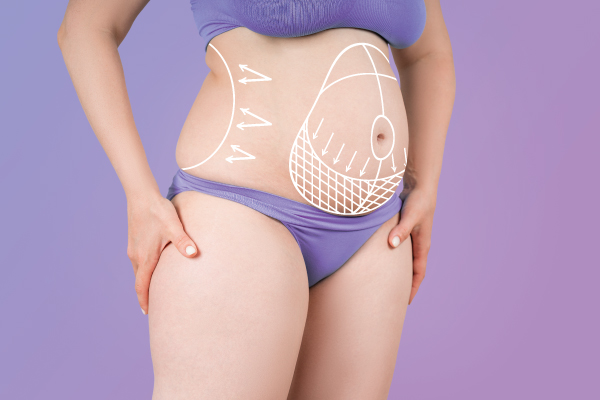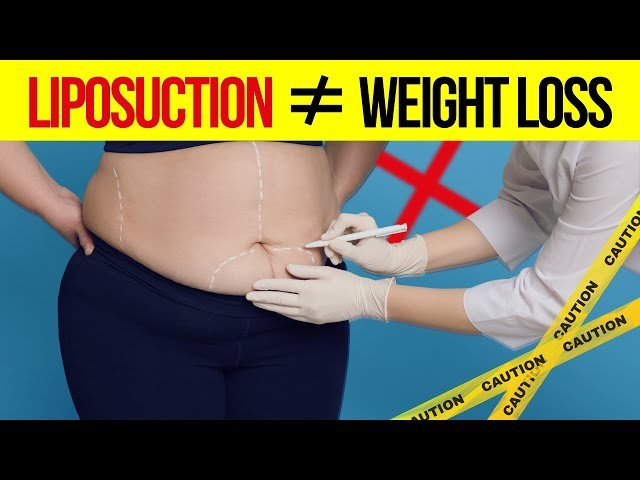Are you struggling to lose stubborn fat despite dieting and exercising? You might be wondering if liposuction could be the quick fix you need.
But is liposuction really a good option for weight loss, or is it just a cosmetic procedure with limits? Before you make any decisions, it’s important to understand what liposuction can and cannot do for your body. Keep reading to discover the truth about this popular treatment and find out if it’s the right choice for your weight loss goals.
Liposuction Basics
Liposuction is a surgical procedure that removes fat from the body. It shapes areas with extra fat that diet and exercise may not fix.
This procedure is not a way to lose a lot of weight. It helps improve body contours and proportions.
What Liposuction Does
Liposuction removes fat cells from specific parts of the body. Common areas include the abdomen, thighs, hips, and arms.
The procedure can reduce fat bulges and create a smoother shape. It does not treat obesity or remove loose skin.
Types Of Liposuction Techniques
There are several liposuction methods. Each uses a different way to break up or remove fat.
- Tumescent Liposuction:Injects fluid to reduce bleeding and pain before suctioning fat.
- Ultrasound-Assisted Liposuction (UAL):Uses ultrasound waves to melt fat for easier removal.
- Laser-Assisted Liposuction (LAL):Uses laser energy to liquefy fat cells before suction.
- Power-Assisted Liposuction (PAL):Uses a vibrating cannula to break up fat faster.
Doctors choose a technique based on the area and the patient’s needs. Each has benefits and limits.

Liposuction Vs. Weight Loss
Liposuction is a surgery that removes fat from specific areas. Weight loss is a process that reduces overall body fat.
People often ask if liposuction is a good way to lose weight. It is important to understand the differences first.
Difference Between Fat Removal And Weight Loss
Liposuction removes fat cells from certain spots. It does not lower your total body weight like diet and exercise do.
Weight loss shrinks fat cells all over the body. It also improves health by lowering fat around organs.
- Liposuction targets specific fat pockets.
- Weight loss reduces fat throughout the body.
- Liposuction does not improve overall health.
- Weight loss can improve blood pressure and heart health.
When Liposuction Helps With Body Contouring
Liposuction works well for shaping areas that do not respond to diet or exercise. These include the belly, thighs, and arms.
This surgery helps people get a smoother, more balanced body shape. It is not a tool for losing large amounts of weight.
- Remove stubborn fat deposits.
- Improve body curves and shape.
- Enhance appearance after weight loss.
- Target small areas for better fit in clothes.
Ideal Candidates
Liposuction is a surgical procedure that removes fat from specific body areas. It is not a solution for overall weight loss.
People considering liposuction should understand who benefits most from this treatment.
Who Benefits Most
Liposuction works best for people close to their ideal weight. It targets stubborn fat pockets that diet and exercise cannot remove.
Ideal candidates usually have firm, elastic skin and good muscle tone. This helps the skin tighten after fat removal.
- Adults within 30% of their ideal body weight
- Individuals with localized fat deposits
- People with good skin elasticity
- Non-smokers or those willing to quit before surgery
Health And Lifestyle Considerations
Good health is important for a safe liposuction procedure and smooth recovery. Candidates should not have serious medical problems.
Maintaining a stable weight and healthy lifestyle after surgery helps keep results long-term.
- No heart or lung diseases
- Stable weight for several months before surgery
- Commitment to healthy eating and exercise
- Realistic expectations about results

Risks And Limitations
Liposuction is a cosmetic procedure to remove fat. It is not a weight-loss method for large amounts.
Knowing the risks and limits helps people decide if liposuction fits their goals.
Possible Side Effects
Liposuction can cause side effects after the surgery. Some effects may last for days or weeks.
Common side effects include swelling, bruising, and numbness in the treated areas.
- Swelling and fluid buildup
- Bruises and skin discoloration
- Numbness or tingling sensations
- Infection risk at the incision sites
- Scarring and skin irregularities
- Possible blood clots or fat embolism
Limitations In Fat Removal
Liposuction removes fat from certain body parts but cannot remove large fat amounts. It is not a weight-loss surgery.
It works best for people near their ideal weight who want to shape their body.
- Cannot replace diet and exercise for weight loss
- Not suitable for very obese individuals
- Fat removed is permanent, but new fat can grow if weight returns
- May not fix cellulite or loose skin
- Body shape changes depend on skin elasticity
Expert Opinions
Liposuction is a popular cosmetic surgery that removes fat from certain body areas. Many people wonder if it is a good choice for weight loss.
Experts from different fields share their views on whether liposuction helps with weight loss and overall health.
Surgeons’ Perspectives
Surgeons say liposuction removes fat pockets that diet and exercise can’t target easily. It shapes the body and improves appearance.
They stress that liposuction is not a weight-loss method. It works best for people near their ideal weight with small fat deposits.
- Liposuction removes localized fat, not overall body fat.
- It is not a treatment for obesity or a substitute for healthy habits.
- Patients must maintain weight after surgery for lasting results.
Nutritionists’ Views
Nutritionists emphasize that liposuction does not improve eating habits or metabolism. It does not teach people how to lose weight safely.
They recommend focusing on diet and exercise for long-term weight control. Liposuction may help with confidence but not health directly.
- Healthy eating and regular exercise are key for weight loss.
- Liposuction does not stop fat from returning without lifestyle changes.
- Proper nutrition supports overall well-being beyond appearance.

Alternative Weight Loss Options
Liposuction is not the best choice for losing weight. It removes fat from specific areas but does not help with overall weight loss. Many people look for safer and long-lasting ways to lose weight.
Diet and exercise are the most common ways to lose weight. There are also non-surgical treatments that can help reduce fat without surgery.
Diet And Exercise
Eating healthy food and moving your body help you lose weight safely. A balanced diet gives your body the nutrients it needs. Exercise burns calories and builds muscle.
Regular exercise improves your health and helps keep weight off. Simple activities like walking or swimming work well. Combine cardio and strength training for best results.
- Eat fruits, vegetables, and whole grains
- Limit sugar and processed foods
- Exercise at least 30 minutes daily
- Mix cardio and strength workouts
- Drink plenty of water
Non-surgical Treatments
Non-surgical treatments reduce fat without cutting the skin. They use heat, cold, or sound waves to break fat cells. These treatments need several sessions and work best with a healthy lifestyle.
These options are less risky than surgery. They help shape your body but do not replace diet and exercise. Always talk to a doctor before starting any treatment.
- CoolSculpting uses cold to freeze fat cells
- Ultrasound melts fat with sound waves
- Laser therapy heats and destroys fat cells
- Radiofrequency tightens skin and reduces fat
Preparing For Liposuction
Liposuction is a surgery to remove fat from certain body areas. It is not a way to lose a lot of weight.
Getting ready for liposuction is important for a safe and good result. This includes talking with a doctor and knowing what to expect.
Consultation Process
During the consultation, the doctor checks your health and body. They ask about your medical history and any medicines you take.
The doctor looks at the areas you want to treat. They explain how the surgery works and any risks involved.
- Discuss your goals clearly
- Share your full health history
- Ask questions about the surgery
- Understand the recovery time
Setting Realistic Expectations
Liposuction helps shape your body but does not cause major weight loss. It works best if you are close to your ideal weight.
Results take time to show. Swelling and bruising may last for weeks after surgery.
- Liposuction removes fat pockets, not large amounts of weight
- Healthy diet and exercise are needed to keep results
- Some unevenness or skin sagging may occur
- Follow all doctor instructions for the best healing
Recovery And Results
Liposuction removes fat from specific body areas. It is not a way to lose a lot of weight fast. Recovery and results vary for each person.
Understanding how to care for yourself after surgery helps you heal well. Knowing what to expect about results keeps your goals clear.
Post-procedure Care
After liposuction, your body needs time to heal. You may feel swelling, bruising, and soreness for several days.
Following care instructions helps reduce problems and speeds recovery. You will likely wear compression garments to support your skin.
- Rest for the first few days after surgery
- Wear compression garments as directed
- Keep the incision areas clean and dry
- Take prescribed medications to manage pain and prevent infection
- Avoid heavy exercise until your doctor says it is safe
Long-term Maintenance
Liposuction removes fat cells, but it does not stop new fat from forming. Maintaining your results needs a healthy lifestyle.
Good habits help keep your body shape after surgery. Weight gain can change your results over time.
- Eat a balanced diet with fruits and vegetables
- Exercise regularly to burn calories and build muscle
- Stay hydrated and get enough sleep
- Check with your doctor for follow-up visits
- Watch your weight and avoid large fluctuations
Frequently Asked Questions
Is Liposuction An Effective Weight Loss Method?
Liposuction is not a primary weight loss tool. It removes stubborn fat pockets but does not replace diet or exercise. It is best for body contouring, not significant weight reduction.
Who Is An Ideal Candidate For Liposuction?
Ideal candidates are near their target weight with firm skin. They have localized fat deposits unresponsive to diet or exercise. Good health and realistic expectations are essential for successful results.
How Long Is The Recovery After Liposuction?
Recovery typically lasts one to two weeks. Patients may experience swelling and bruising, which gradually improves. Light activities can resume quickly, but strenuous exercise should be avoided for several weeks.
Can Liposuction Remove Cellulite Or Loose Skin?
Liposuction does not effectively treat cellulite or tighten loose skin. It primarily removes fat cells. Additional treatments may be needed for skin tightening or cellulite reduction.
Conclusion
Liposuction isn’t a weight loss method. It’s for body contouring. Results can be dramatic, but it’s not a substitute for healthy habits. Consider lifestyle changes like diet and exercise first. They offer long-term benefits. Liposuction may help with stubborn fat areas.
Always consult a doctor before deciding. Know the risks and recovery time. It’s a personal choice. Make an informed decision. Think about your goals and health needs. Liposuction can enhance your shape. But it won’t fix weight issues alone. Stay informed.
Choose wisely. Your health matters most.



